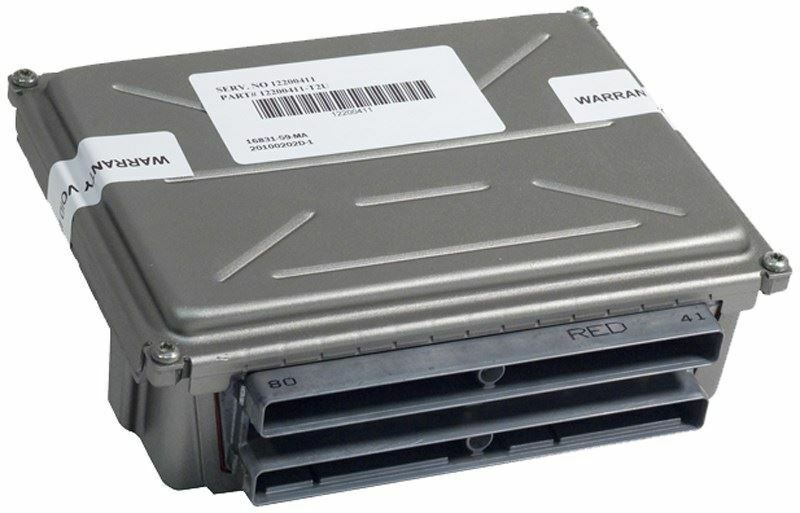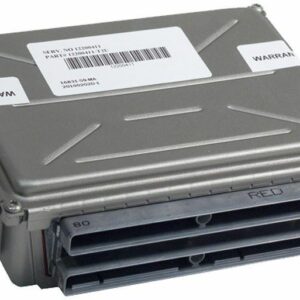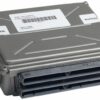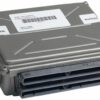Restore Peak Performance to Your GM Truck or Van
Is your 2003 Silverado, Sierra, or Express van running rough, stalling unexpectedly, or throwing confusing check engine light codes? You’re not just dealing with an annoyance; you’re facing a failure of the vehicle’s central command center. The Powertrain Control Module (PCM), often called the engine computer, is the brain behind your engine’s performance, fuel economy, and emissions. When it fails, it can cause a cascade of frustrating and difficult-to-diagnose problems. This isn’t just a part—it’s the solution to getting your reliable truck back on the road.
This isn’t a generic, one-size-fits-all module from a salvage yard. We provide a high-quality replacement PCM, part number 12570558, that is professionally programmed to your vehicle’s specific Vehicle Identification Number (VIN). This critical step ensures complete compatibility and installs the latest GM factory software updates, often correcting underlying issues the original software may have had. By matching it to your VIN, we ensure it communicates perfectly with your truck’s specific engine, transmission, and options package, eliminating the need for an expensive trip to the dealership for programming.
Is Your Truck Exhibiting These Telltale Signs?
A failing PCM can manifest in many ways. I’ve seen hundreds of these in my shop, and the symptoms often overlap with other components, making diagnosis tricky. If you’re experiencing any of the following, a faulty module is a likely culprit:
- ✔ Check Engine Light is on with communication-related codes (like U0100) or internal processor failure codes (P0601, P0606).
- ✔ Your engine cranks but refuses to start.
- ✔ The vehicle stalls intermittently, especially after warming up.
- ✔ A noticeable drop in fuel efficiency.
- ✔ Harsh or erratic automatic transmission shifting.
- ✔ The cooling fans run constantly or not at all.
- ✔ Communication errors with your diagnostic scan tool.
A Technician’s Notebook: The Intermittent No-Start Nightmare
A customer brought in a 2003 Sierra 2500 with the 8.1L that had an intermittent no-start condition that two other shops couldn’t solve. It would run perfectly for days, then refuse to start for an hour. There were no consistent codes. After checking all the basics—fuel pressure, spark, and crank sensor signal—I noticed the issue only happened when the truck was hot. On a hunch, I used a heat gun to gently warm the PCM while the engine was running. Within minutes, the engine sputtered and died. The internal processor was failing under thermal stress. A new, properly programmed PCM like this one solved the problem permanently. It’s a classic failure mode for these P59 controllers.
Your Guide to a Straightforward Installation
Replacing the 2003 Silverado 1500 PCM is a task a confident DIYer can handle. The key is patience and following the correct procedure to avoid damaging the new module or other electronics. On most of these trucks and vans, the PCM is located under the hood on the driver’s side, near the battery.
- Safety First: Disconnect the negative terminal from your vehicle’s battery and secure it away from the post.
- Locate the Module: Identify the PCM. It’s a silver box with multiple large wiring harness connectors.
- Disconnect the Harnesses: Carefully release the locking levers or tabs on each electrical connector and pull them straight out from the module. Never force them. Inspect the pins for any corrosion or damage.
- Remove the Old PCM: Unbolt the module from its mounting bracket. Keep the hardware, as you’ll need it for the new unit.
- Install the New Module: Mount the new, pre-programmed PCM onto the bracket and secure it with the original hardware.
- Reconnect Everything: Firmly plug the wiring harnesses back into the new module until they click and the locking levers are fully engaged. Reconnect the negative battery terminal.
- Perform Security Relearn: You will likely need to perform a security relearn procedure (often called a CASE relearn or Passlock relearn) for the vehicle to start. This procedure typically involves turning the key to the ‘ON’ position for 10-15 minutes, then off, and repeating this cycle three times. Consult your vehicle’s service information for the exact steps.
Verified Vehicle Compatibility
This module is a direct replacement for a wide range of GM vehicles. Please verify your part number and application from the list below. This part is compatible with service numbers: 12581565, 8125815650, 12570557, 12570558, 12576106, 12576869, 12578127, 88864822, and 89017733.
- 2003 Chevrolet/GMC Trucks & SUVs: Silverado/Sierra 1500 (4.3L), Silverado/Sierra 2500/3500 (8.1L Gas), Suburban 2500 (8.1L), Yukon XL 2500 (8.1L), Avalanche 2500, S10/Sonoma (4.3L), Blazer/Jimmy (S-series)
- 2003 Chevrolet/GMC Vans: Express/Savana 1500, 2500, 3500, Astro/Safari
- 2004 Cadillac & Chevrolet: CTS (Base, ID 12581565), Corvette (ID 12581565)
Frequently Asked Questions
How do I provide my VIN for programming?
After you complete your purchase, simply send us a message with your 17-digit Vehicle Identification Number (VIN). We cannot ship your module until we receive this information, as the programming is essential for the part to function in your vehicle.
Will I need to do anything else after installation?
In most cases, you will need to perform a security relearn procedure, which syncs the new PCM with your vehicle’s anti-theft system. This can usually be done without special tools and takes about 30 minutes. Some vehicles may also require a Crankshaft Position Variation (CASE) relearn, which requires a capable scan tool.
Is this a plug-and-play part?
Because we program it to your VIN before shipping, it is as close to plug-and-play as possible. It eliminates the need for dealership-level programming tools. The only additional step is the security relearn mentioned above.
What if my original part number isn’t 12570558?
This module replaces several different service numbers. Please check the detailed list of compatible service numbers in our description. As long as your original module’s number is on that list, this part will work for your application.
What causes a PCM to fail?
PCMs are robust, but they can fail due to age, heat cycles, electrical shorts from other failing components (like ignition coils or injectors), or water intrusion. Our quality-tested modules are a reliable solution to these common failures.



